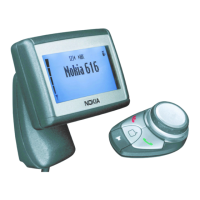TFE-4/RV-1 Company Confidential
TF4 Technical Information Nokia Customer Care
Page 8b-54 Copyright © 2005 Nokia Corporation. Issue 2.0 Mar/2005
Company Confidential
• Two PREGAIN amplifiers, one for EGSM900 and one for GSM1800.
• Two passive I/Q mixers (MIX), one for EGSM900 and one for GSM1800.
The resulting BB signal is further amplified in the BB chain. For this purpose no external
circuitry is required:
• Base band amplifiers (BBAMP1). That amplifiers implement the initial channel
filtering.
• Low pass filters (LPF1).
• DC compensation / AGC amplifiers (DCN1). They implement gain steps from 0dB
to 24dB in 6dB steps.
• Attenuators (AGC). They implement gain steps from -48dB to 0dB in 6dB steps,
yielding a total gain range of 72dB together with DCN1.
• Bi-quad filters (LPF2).
• DC compensation amplifiers (DCN2).
The differential base band outputs are internally DC coupled and can be connected
directly to the ADC inputs of the RF converter chip. The common mode level is set equal
to the VBEXT reference voltage.
EGSM (EGSM900) Transmitter
General instructions for EGSM TX troubleshooting
Apply a RF-cable to the RF-connector and connected to the measurement equipment
(GSM Test equipment, Powermeter, Spectrum Analyzer, or similar). Be sure to use at least
a 10dB attenuator, otherwise the results may be incorrect.
Step 1: Setting up Phone and Phoenix
• Start Phoenix Service Software
• Open the FBUS connection
• Select File /Scan Product (Ctrl-R)
• Wait until phone information shows in the lower right corner of the screen.
• Set operating mode to local mode
• Activate RF-Controls
• Select Maintenance/ Testing/ RF Controls. Wait until the RF Controls window
pops up
• Select: Band GSM 900
Active unit TX
Operation mode Burst
RX/TX Channel 37
TX PA Mode Free
TX Power Level 10
TX Data Type Random

